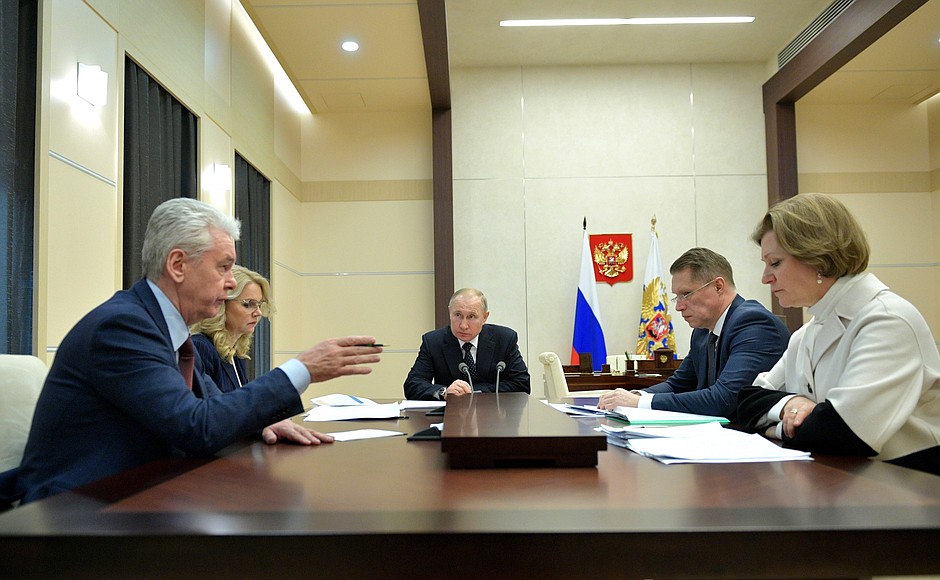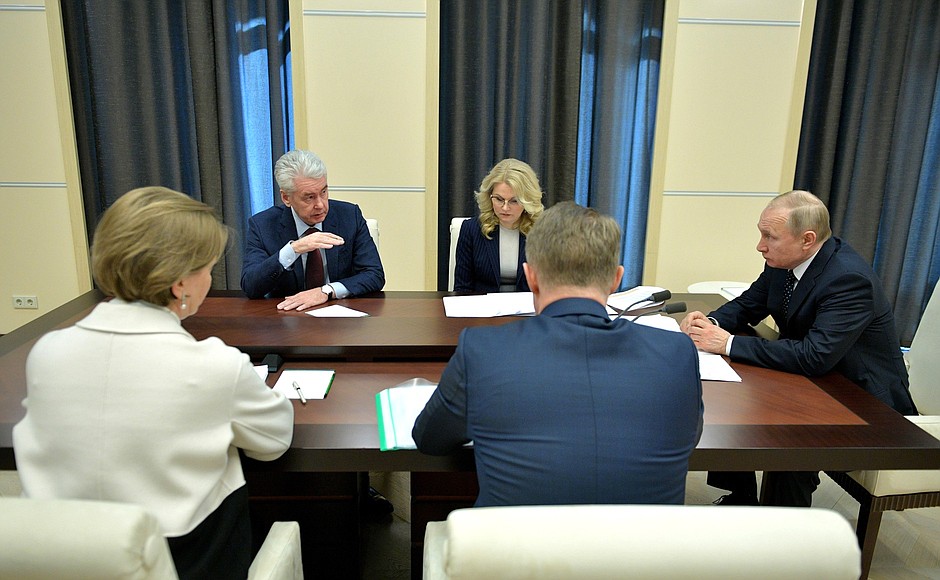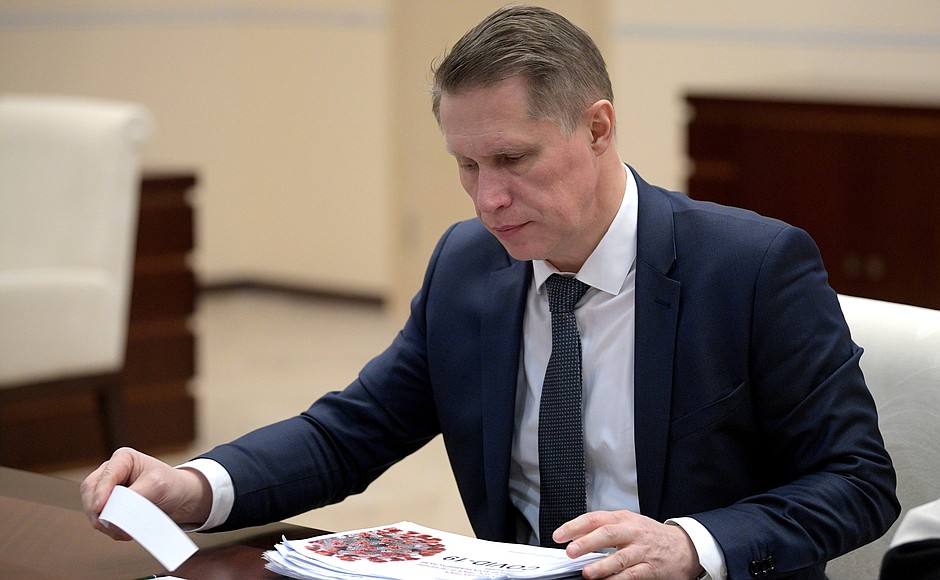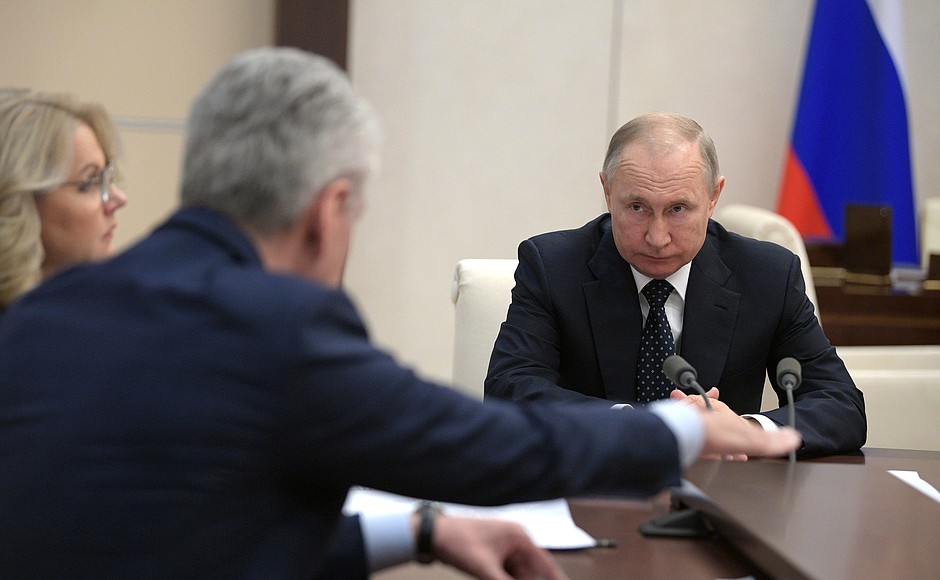The meeting was attended by Deputy Prime Minister Tatyana Golikova, Moscow Mayor Sergei Sobyanin, Healthcare Minister Mikhail Murashko and Head of the Federal Service for the Oversight of Consumer Protection and Welfare (Rospotrebnadzor) Anna Popova.
* * *
President of Russia Vladimir Putin: The reason for our meeting is obvious. Ms Golikova and I have discussed this matter, and now we will talk about it some more.
Moscow has been affected the most.
Moscow Mayor Sergei Sobyanin: We already have some 500 coronavirus cases. Some of them have not been confirmed yet, we are working on it.
Rospotrebnadzor Head Anna Popova: We have officially confirmed 290 cases and are waiting for test results for another 150 people.
Vladimir Putin: Are all of them in Moscow?
Anna Popova: Yes.
Sergei Sobyanin: We believe that, realistically, between 80 and 90 percent of them will test positive. But the difference between 400 and 500 cases is not that big. The dynamic is high, the situation is becoming serious, especially since many people who have returned from abroad are staying at home and have not been tested. Those who have the opportunity to do so have moved to their dachas or are staying at home. They are feeling well, fortunately, so they should stay there. But many more people have fallen ill.
Aware of this dynamic, we have started taking additional measures, increasing hospital capacities and testing. We have opened nine polymerase chain reaction (PCR) labs. They tested 3,000 people yesterday and will do another 13,000 tests by the end of the week. Ms Popova is helping us with her labs as well. We are testing all the samples we receive, using also Chinese and Korean test kits. We have opened a special department at the Kommunarka hospital to check these tests to sort them out, because we are not sure of their quality even though these are certified tests. We will inspect them and choose the most effective ones. After that we will discuss the matter with Ms Popova to decide which tests should be manufactured for the purpose of health screening, possibly even informally.
We have recently introduced quarantine measures for people aged 65 or over. Thank you for supporting this initiative. We used to think that the high-risk group consisted of people arriving from abroad. Now a million people have arrived in Russia over the past 10 days, and we have to place them under quarantine so that they stay at home. This is one story. At the same time, elderly people over the age of 65 are in what we now believe to be the actual high-risk group.
Vladimir Putin: Yes, you and I had a conversation on this subject.
Sergei Sobyanin: We imposed a quarantine, which comes into effect on Thursday, and all these people will have to stay at home, even those who work. They will be placed on sick leave.
I believe that we could recommend regions experiencing similar trends to adopt measures of this kind. Moscow Region Governor Andrei Vorobyov and I introduced identical measures. The same should be done in St Petersburg and in all the million-plus cities, so that they all act along the same lines. These people are now our greatest challenge. They will require intensive care units, and this group will suffer the most severe cases. We need to flatten the curve as much as possible so that they arrive in our hospitals gradually rather than all at once. Otherwise, the system will be overwhelmed. This is what our efforts are all about.
We have drafted instructions for the regions and calculated the number of hospital beds needed by each of them, and in what wards, and worked out standards for hospital beds and hospitals in general, how many intensive care units will be required, how many ventilators and oxygen beds, and of what kind. This is a straightforward and clear standard. The instructions will be signed today and forwarded to the regions. I would like to ask you to instruct Anton Vaino to get in touch with plenipotentiary envoys to the federal districts so that we all work together on this issue and introduce strict control, since there is a lack of awareness in some regions. For example, a governor may think that if there is only person who falls sick…
In fact, testing levels are too low, and no one actually knows…
Deputy Prime Minister Tatyana Golikova: We have tested 163,000 people.
Sergei Sobyanin: …the real situation around the world.
This is how the plan looks, in all objectivity. This is not a question of good or bad. This is the objective reality everywhere. We have to understand that if 6,000 people arrive in Primorye Territory from virus-affected areas, this is a big problem, and sooner or later it will materialise.
For this reason, all regions without exception, whether they have infected people or not, have to be prepared. We will issue instructions to this effect shortly, and will oversee their implementation on the ground.
Vladimir Putin: We will discuss these measures at a meeting with the Government in a couple of hours.
Most of the infected people are in Kommunarka, right?
Sergei Sobyanin: Yes, the hospital in Kommunarka has the biggest experience. It has 500 beds. Some of the patients are not ill but are suspected cases or people who were in close contact with those infected, and there are also confirmed cases, including severe ones.
Overall, we have eight moderately severe cases, including two very severe ones: one in Kommunarka and one in another place, the 52nd Hospital, I believe. They are already hooked up to ventilators.
Vladimir Putin: So Kommunarka specialises on cases of this kind.
Tatyana Golikova: It was repurposed.
Vladimir Putin: So this was a matter of repurposing.
Sergei Sobyanin: Yes. Here is what we did. We repurposed the Kommunarka hospital to treat these cases. Yesterday I opened another clinic that was designed to serve as a state-of-the art turnkey-ready perinatal centre, but it was repurposed along with seven other hospital buildings. We are about to close a big hospital with 1,300 beds in order to repurpose it this way. Within three to four weeks we intend to expand our capacity to 5,000 beds dedicated to treating coronavirus patients. We would like to ask our colleagues to give us another 5,000 beds at federal institutions.
We need to take the same measures in all other regions. This requires extensive and major efforts. Ahead of the meeting, I visited the construction site of a new hospital. It took us two weeks to complete 40 percent of the project. Two weeks ago, I went there, pointed my finger at an empty plot and showed were the hospital was to be erected. Today, 5,000 people are working there, and we will probably open the hospital in three weeks. This will be a huge hospital. We visited the Morozov Hospital earlier today, but this one will be even bigger. It will be spread out horizontally: a one-storey building with staff living quarters, etc. It will be an enclosed space. Half of the beds in this hospital, 260 out of 500, will be in intensive-care units, which is something we have never seen before here.
I propose that we visit Kommunarka, where there are only 60 beds in intensive-care units, while the new hospital will have 260. This means that there will be a lot of equipment. Building barracks does not make any sense at this point in time. We need facilities for treating severe cases.
Vladimir Putin: Good. Let us go there and see how it all works in Kommunarka.
Sergei Sobyanin: Please do. And when this new hospital is ready, we can take a helicopter to visit it.
Vladimir Putin: Fine, but now we will take a look at the Kommunarka hospital.
<…>



